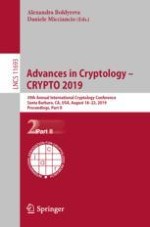2019 | OriginalPaper | Buchkapitel
Simultaneous Amplification: The Case of Non-interactive Zero-Knowledge
verfasst von : Vipul Goyal, Aayush Jain, Amit Sahai
Erschienen in: Advances in Cryptology – CRYPTO 2019
Aktivieren Sie unsere intelligente Suche, um passende Fachinhalte oder Patente zu finden.
Wählen Sie Textabschnitte aus um mit Künstlicher Intelligenz passenden Patente zu finden. powered by
Markieren Sie Textabschnitte, um KI-gestützt weitere passende Inhalte zu finden. powered by
Abstract
-
Parallel Repetition: We show that using parallel repetition any \(\delta _s-\)sound and \(\delta _z-\)zero-knowledge \(\mathsf {NIZK}\) candidate can be turned into (roughly) \(\delta ^n_s-\)sound and \(1-(1-\delta _{z})^n-\)zero-knowledge candidate. Here n is the repetition parameter.
-
MPC based Repetition: We propose a new transformation that amplifies zero-knowledge in the same way that parallel repetition amplifies soundness. We show that using this any \(\delta _s-\)sound and \(\delta _z-\)zero-knowledge \(\mathsf {NIZK}\) candidate can be turned into (roughly) \(1-(1-\delta _s)^n-\)sound and \(2\cdot \delta ^n_{z}-\)zero-knowledge candidate.
